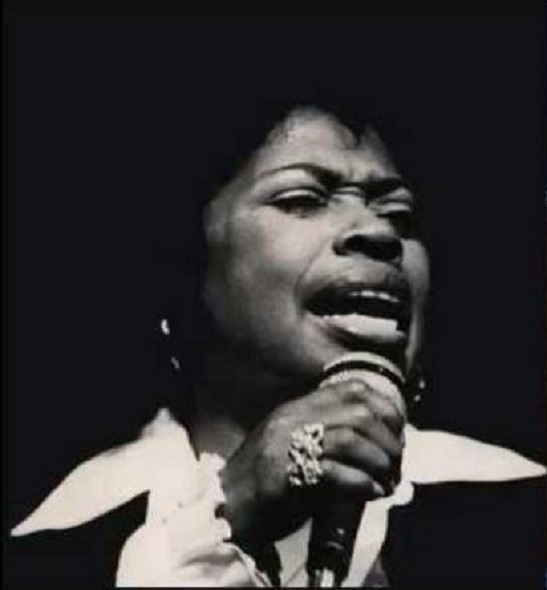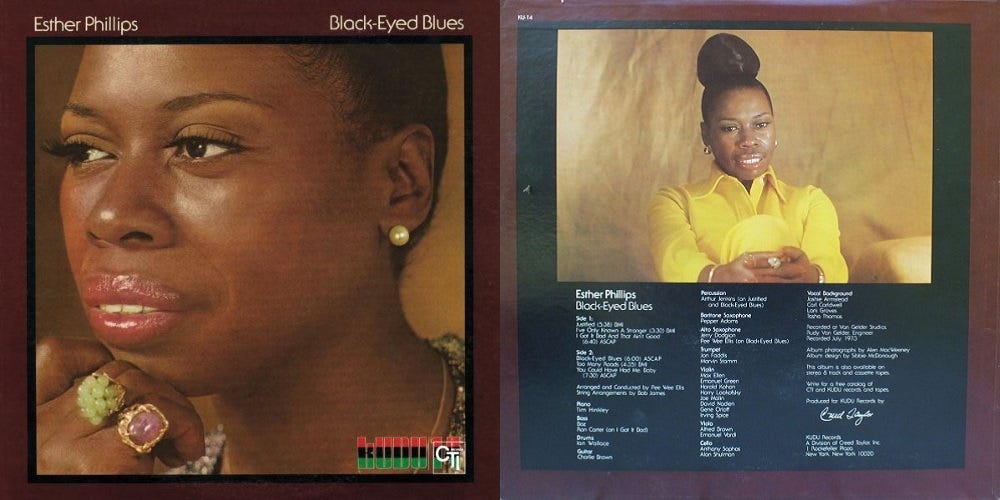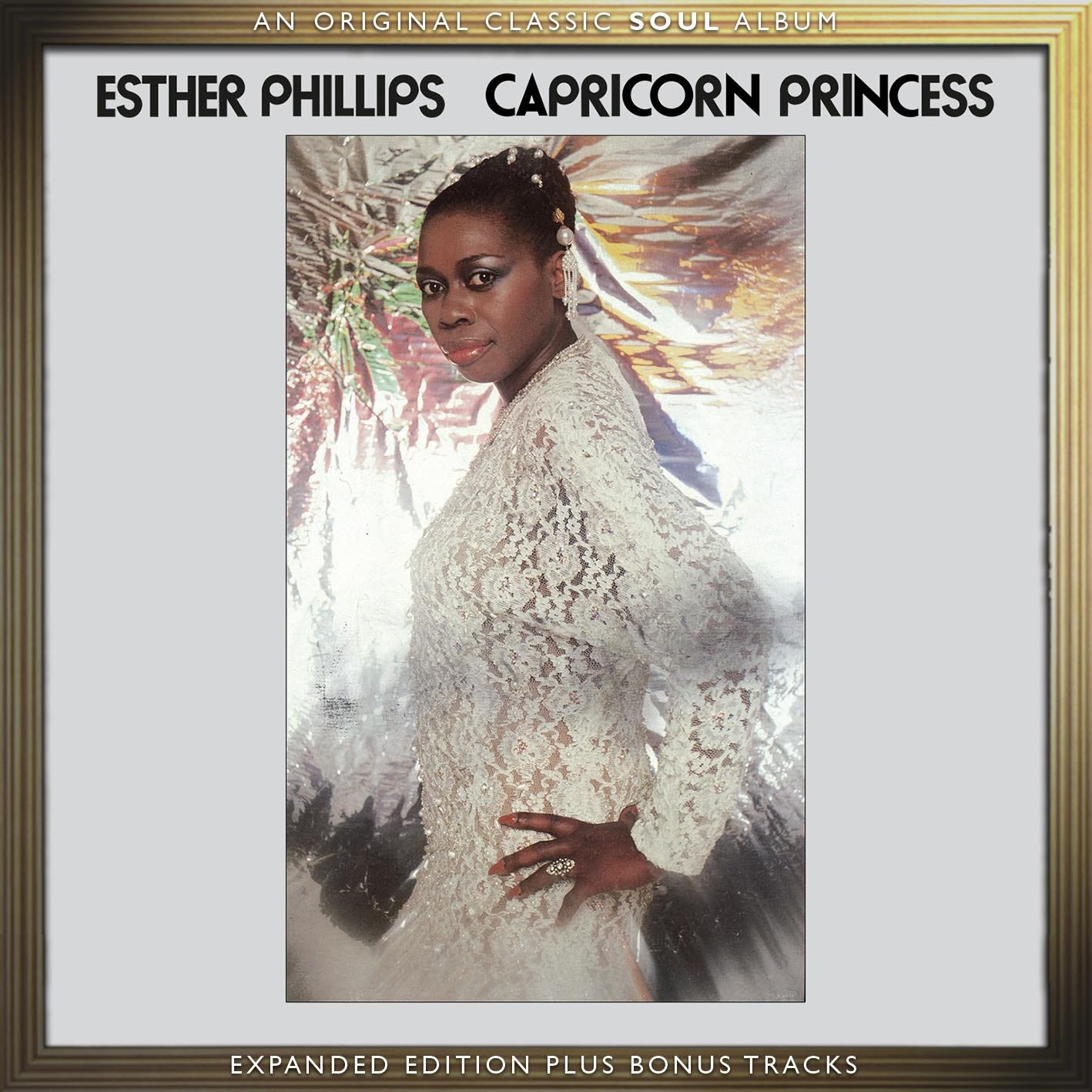Esther Phillips (December 23, 1935 – August 7, 1984) – Justified (1973)
An epic breakup anthem from the gifted singer's Black-Eyed Blues LP, produced by Creed Taylor and written by Bill Withers.
Watch full video on Twitter.
View most updated version of this post on Substack.
Esther Phillips was an extremely talented singer who rose to fame as a teenager with three #1 R&B records in 1950, her debut year as a recording artist. She recorded for Atlantic during the sixties and Kudu/CTI in the seventies, and received several Grammy nominations. During her career she released records across a diverse number of genres, including R&B, soul, jazz, blues, pop, and country.
Born in Galveston, Texas, Esther Mae Jones sang in church from a young age. Her parents divorced when she was in her early teens and she began traveling back and forth between her father in Houston and her mother in the Watts neighborhood of Los Angeles. In 1949, at age 14, she won an amateur talent contest at a Watts nightclub owned by singer Johnny Otis aka the Godfather of R&B (and father of Shuggie Otis), who subsequently recorded her first records as Little Esther and put her in his traveling revue. Her stage name came from a gas station sign for the Phillips 66 chain.
Her career rocketed to an early start in 1950 with the hit record “Double Crossing Blues,” recorded with the Johnny Otis Quintette and the Robins for Savoy Records, which hit #1 R&B. Her follow up single “Mistrusting Blues” (1950) also reached #1 R&B, as did another single released soon afterwards, “Cupid’s Boogie” (1950). That same year, she released four more singles that went top-ten R&B, all backed by Johnny Otis, who Billboard named 1950’s R&B artist of the year.
Hot off her early success, she left Otis and Savoy and signed with Cincinnati-based Federal Records. She would record more than thirty songs for the label, but only one charted, “Ring-a-Ding-Doo” in 1952. By the mid-fifties she had developed a heroin addiction. She left the music business in 1954 and returned home to Houston. For the next several years she played small nightclubs around the South while trying to stay clean.
Phillips again went to #1 R&B in 1962 with her cover of the country and western standard “Release Me,” originally written by songwriters Eddie "Piano" Miller and Robert Yount in 1949. Her version also crossed over to #8 on the Billboard Hot 100. She signed to Atlantic in the mid-sixties and memorably covered the Beatles’ “And I Love Him.”
Beginning with her critically acclaimed 1972 LP From a Whisper to a Scream, she recorded several classic albums for Creed Taylor’s Kudu Records, a subsidiary of his CTI label. In 1973, Taylor produced her Black-Eyed Blues LP, which hit #17 on the R&B album charts and #15 on the jazz charts.
The album was arranged and conducted by James Brown’s former bandleader Alfred “Pee Wee” Ellis, who also played alto sax on its funky, bluesy title track. Strings were arranged by Bob James.
Black-Eyed Blues’ superb opening cut “Justified” is arguably one of the greatest breakup songs of all time, written by Bill Withers with a powerful spoken word interlude by Phillips. It featured King Crimson members Boz Burrell on bass and Ian Wallace on drums, plus Jerry Dodgion on alto sax, Pepper Adams on baritone sax, Charlie Brown on guitar, and Tim Hinkley on piano.
Her 1975 single “What a Diff'rence a Day Makes” became her biggest charting hit in a decade when it went to #10 R&B. It ended up as the title track to her next Kudu/CTI album, again produced by Taylor, which reached #13 on the R&B album charts.
In 1976, for her Kudu LP Capricorn Princess, Taylor produced the laid back, bass-heavy, Curtis Mayfield-esque jam “All The Way Down.” It featured Don Grolnick on clavinet, Andy Newmark on drums, John Tropea on guitar, Hugh McCracken on harmonica, Ralph MacDonald on percussion, and Joe Farrell on alto sax and flute.
The following year in 1977, “Pee Wee” Ellis produced her cover of Denise LaSalle’s “Love Addict,“ which Lasalle co-wrote with her second husband James “Super” Wolf and released her own version on her album The Bitch Is Bad! that same year. Its lyrics were especially poignant in light of Phillips’ own struggle with addiction, which continued to haunt her throughout her lifetime.
For her 1979 LP Here’s Esther… on Mercury, Harvey Mason produced the stellar disco jam “Oo Oop Oo Oop,” whose unusual title may have prevented it from blowing up like it should have. Co-written by Michael Zager of “Let’s All Chant” fame and Alvin Fields, its infectious beat only let up long enough for Phillips to tell the dancefloor what was what in an epic sermon that would have made Rudy Ray Moore proud:
“I want everybody in here to get down. Do the freak! I wantcha to do the freak so long ‘til you just freak out. Get down until ya just fall out. And just give it up, give it on up! And let’s get down up in here this morning, that’s what it’s all about! We’re gonna get it! And we’re gonna be here ‘til the sun comes up early in the morning, this morn. Come on! Everybody, come on! And let’s just get it on! And let’s keep that groove right there, hold it right there, just right on the money!”
Sadly, Phillips died of liver and kidney failure in 1984 due to her decades of drug addiction, gone much too soon at age 48.
#soul #funk #disco #Esther Phillips







